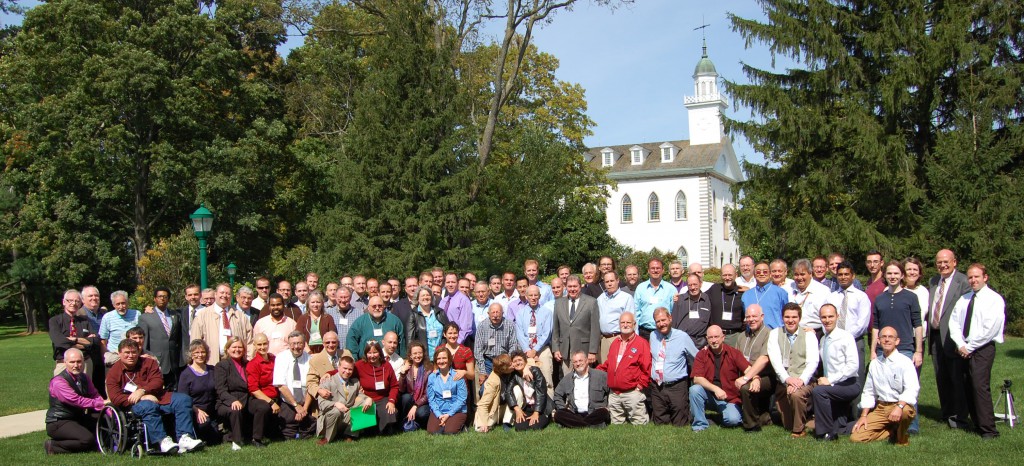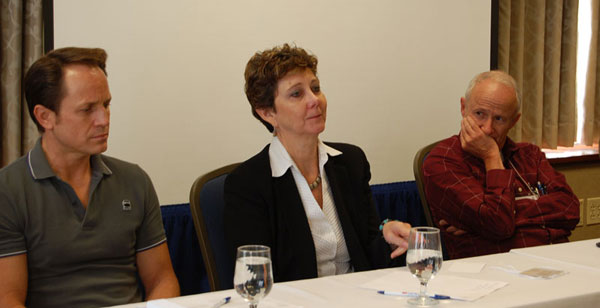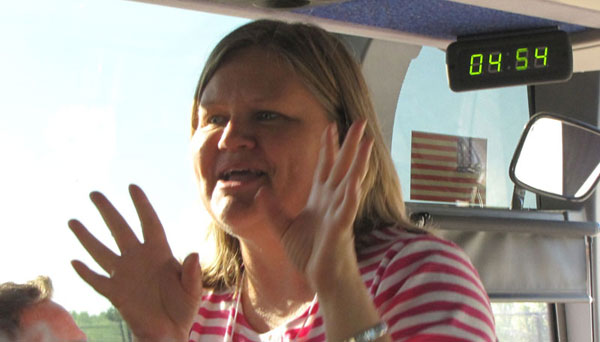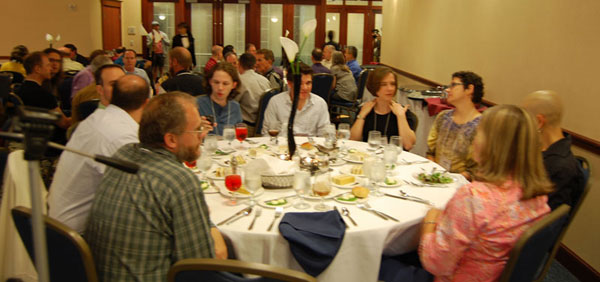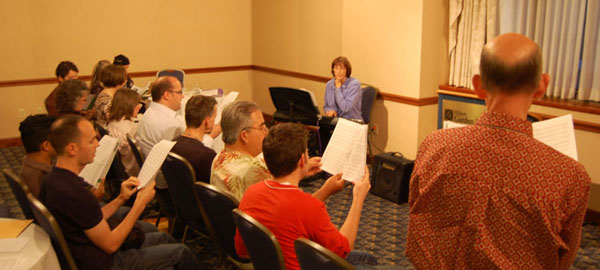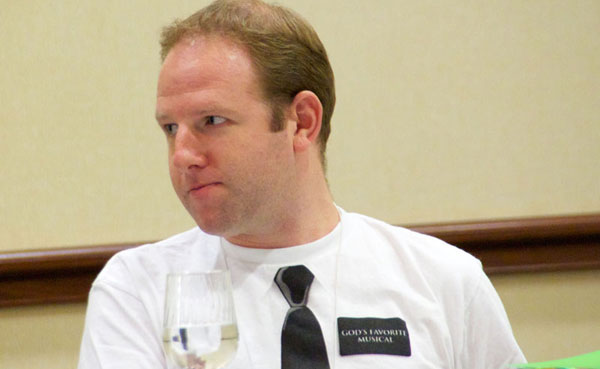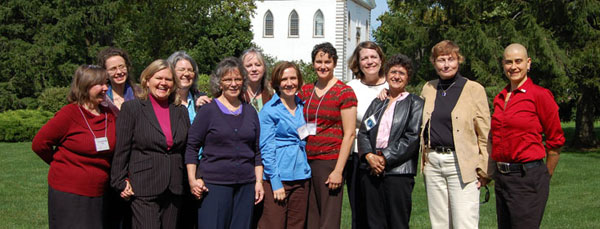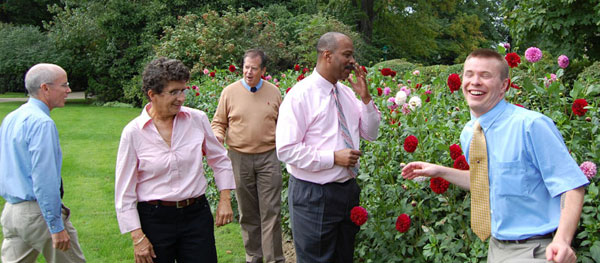2011 Conference Report
Prepared by James Kent and Hugo Salinas
“Visions and Blessings”
Friday
With strong interfaith participation, an inspiring choir, and a historic devotional held in the lower court of the Kirtland Temple, some 110 Affirmation members, along with partners, relatives, and friends, gathered September 16-18 in Cleveland and Kirtland for our annual family reunion. This was the first time in Affirmation history that the annual conference was held in the Midwest. The Kirtland Temple was the perfect setting to celebrate our blessings and share the vision of a changing world.
Events started Friday morning with a meeting of the executive committee. In the afternoon, members, leaders, and supporters gathered for the Council of Chapter Representatives meeting to discuss the business of Affirmation. Smaller groups, including conference first timers, Gamofites (Gay Mormon Fathers), and People of Color held receptions in the hotel. The conference started formally at 6:00 pm.
“I’d like to welcome all of you to Cleveland,” said Affirmation President David Melson as he opened the conference. Vice Presidents Mary England and Joshua Behn also welcomed Affirmation members and helped David introduce speakers and make announcements throughout the weekend.
Friday evening we heard two speakers who come from other religious traditions: David Yost, an actor and producer who grew up in the Community of Christ, and F. Joseph Finnigan, a Roman Catholic who spent five years as a vowed Benedictine monk.
After leading the audience in singing “We Are One in the Spirit,” David Yost recounted his experiences growing up as a gay man, attending Graceland University, experiencing homophobia in a Hollywood studio, “praying the gay away,” and spending $16,000 so that he could change his orientation. This led to David’s contemplating suicide and having a nervous breakdown. David told the audience that he finally decided to listen to the Spirit and begin the journey of self-acceptance. Today he works with organizations engaged in suicide prevention.
F. Joseph Finnigan spoke about the two “Ohs!” that we experience as LGBT people of religious background: The first one is the way we surprise and sometimes even shock our relatives when we come out, and the second one is the way we surprise and shock our LGBT friends when they found out that we are religious.
“‘Praying the gay away’ is asking for God’s will to work outside of God’s will,” said Joseph. “God’s will has made us homosexual people, and it is good and it is going to make the world a better place once they come into a greater understanding of love.”
After the speeches, some Affirmation members stayed in the reception room for the first of three choir rehearsals. With Judy as the chorister and Kerry Norman at the keyboard and piano, the choir prepared the hymns to be sung during the Sunday devotional.
Saturday Plenary and Workshops
Saturday events started early, with breakfast and a speech by Jill McCrory, president of the Association of Welcoming Baptists (AWEB). Jill, who ministers at a Metropolitan Community Church in Maryland and has performed legally recognized same-sex weddings in Washington D.C., said that in order to work within the traditions of the Baptist Church, Welcoming Baptists have to break rules and stretch boundaries.
Jill spoke candidly about the challenges of talking to evangelical and conservative Baptists. “We have to remember that what we’re talking about is offering radical hospitality,” she said. “One of the most important things that I learned in this past year is to remember that [conservatives] have been taught what they think they know by people they love: their pastors, their elders, their grandfathers, their grandmothers, their parents.”
Jill said that ten years ago, when the American Baptist Convention barred AWEB from exhibiting during convention, AWEB began to stand outside the worship services singing hymns. “[Before accepting us] it takes getting to understand us first,” she said, “and realize that we all sing the same hymns.”
“This movement takes creativity, and rule-breaking, and one-on-one conversations, and education, and perseverance,” Jill said. “My prayer for you is that you’re successful in your efforts to see that all people be welcomed into the full life and ministry of the LDS communities and that you truly become a strong voice of LGBT Mormons across this land. May God’s welcome continue to inspire you all.”
The morning workshops brought a diversity of presenters to tackle a variety of issues. Two workshops were open forums to express opinions and exchange ideas about the future of Affirmation. Dr. Jerry Argetsinger, from the Rochester Institute of Technology, discussed the history and significance of gay Mormon film and drama. Fred Bowers discussed how to use volunteers and publicity to build Affirmation chapters. Al Smith invited participants to reflect on times of transition in their lives. David Baker and Hugo Salinas discussed the law of chastity and its potential in the lives of LGBT Mormons.
Two workshops with a panel format spent much of their time interacting with the audience. The first panel, “Families and Acceptance,” discussed the way to greater acceptance within families. The second panel, “Do I Stay or Do I Go?” focused on the very personal and difficult decisions that LGBT Mormons and supporters face as they try to decide what level of involvement they will have in the LDS Church.
Saturday Afternoon
Saturday afternoon included time to relax, to explore Cleveland, or to tour Historic Kirtland and the Kirtland Temple. Special arrangements were made in advance with both the LDS Visitor Center, which owns Historic Kirtland, and the Visitors and Spiritual Formation Center of the Community of Christ, which owns the Kirtland Temple and surrounding buildings.
Instead of the regular young sister missionaries, the LDS Visitor Center assigned two missionary couples, the Johnsons (from England) and the Higbees (from Utah) the task of leading the tour, which included a visit to the School of the Prophets, which once operated on the top floor of the Newell K. Whitney store. The room where, according to Brigham Young, the apostles used to “light their pipes and, while smoking, talk about the great things of the kingdom, and spit all over the room” is part of the tour, but the floor where the apostles used to spit tobacco has since been replaced.
Community of Christ guides took us though the three levels of the Kirtland Temple: the lower court, the upper court, and the attic floor, which once housed the Kirtland High School and Joseph Smith’s office. Although the endowment had not yet been instituted, a tour guide told us that the Kirtland Temple was used for washings, anointings, and the blessing of the sacrament.
In the Community of Christ Visitor Center we watched a remarkable presentation by John Hamer, executive director of the John Whitmer Historical Association. John described the history of the Latter Day Saints movement through divergent paths leading not to one, but to a constellation of churches which trace their origins back to Joseph Smith, including the LDS Church, the Community of Christ, the Church of Christ (Temple Lot), and several branches of Fundamentalist Mormons.
While the LDS Church developed elaborate temple rituals and constructed many temples, the Community of Christ built only one additional temple. Erected in Independence, Missouri, and open to all, the Community of Christ Temple is dedicated to “the pursuit of peace, reconciliation, and healing of the spirit” (Community of Christ edition of Doctrine and Covenants, Section 156). Affirmation members and leaders toured the Independence Temple in March 2010.
On the bus back to Cleveland, Judy led us in singing a few Primary classics: “Popcorn Popping on the Apricot Tree,” “Book of Mormon Stories,” “I Am A Child of God,” “Jesus Wants Me for a Sunbeam,” and “The Leafy Treetops.”
Banquet and Awards
A reception was held shortly before the banquet, where candidates for president of Affirmation during the 2012 term were presented. Emmanuel, from New York, and Joshua Behn, from Hawaii, declared their candidacy and made brief remarks. (More formal statements from both candidates will be included in the November issue of Affinity).
During the Awards Banquet, Affirmation hosted straight supporters, leaders of the Community of Christ, and members of GALA (Gay and Lesbian Acceptance). Lachlan MacKay, director of historic sites for the Community of Christ, came all the way from his office in Nauvoo to help with the Kirtland Temple tours. Ron Romig, director of the Visitors and Spiritual Formation Center in Kirtland, came to the banquet with his wife Anne, who also works in the Center. Former Dialogue editor Neal Chandler and assistant editor Keith Norman, who during their tenure advanced the discussion of LGBT issues in the journal, were also present.
David Melson turned the time over to Ricky Gilbert, chair of the Morten Award Committee. Ricky gave an account of the origins of the Award, which had been first suggested by Ron Kershaw to the Council of Chapter Representatives in the spring of 1987. “They didn’t establish how often or when they would give this Award,” Ricky explained, “so it’s not really set as being an annual award.”
“For several reasons,” Ricky added, “the committee this year has not been able to come to a decision as to whom to give the Award to. So this year we will not be giving out an award.”
David Melson then announced the Allies Award, which is given to someone who is not necessarily LGBT but “has demonstrated an outstanding level of friendship and support for Affirmation.” The Award was given this year to Bill and Lois Russell, from Lamoni, Iowa. Strong supporters of LGBT equality, Bill and Lois have been involved with both Gay and Lesbian Acceptance (GALA) in the Community of Christ and with Affirmation: Gay and Lesbian Mormons.
A retired professor and former chair of the Division of Social Science at Graceland University, Bill has supported progressive causes, civil rights, and women’s issues for five decades. The editor of Homosexual Saints: The Community of Christ Experience, Bill ended that volume with a powerful call to inclusion: “No matter what denomination we’re talking about, when we deal with the question about whether we accept homosexuals as equals in the church and before God, the question we are asking is, ‘Are we truly a Community of Christ?’ If homosexuals are not treated as equals in a particular church, in that regard it cannot responsibly claim to represent Jesus Christ.”
The banquet this year included two outstanding speakers: Affirmation member Sam Wolfe and straight supporter Brad Carmack. A lawyer specializing in LGBT rights, Sam Wolfe has recently helped launch the LGBT Rights Project at the Southern Poverty Law Center in Montgomery, Alabama. The focus of the Project is ensuring safe schools.
Sam told the audience that his main case involves the Anoka-Hennepin school district in Minnesota, where nine students committed suicide in the last two years, with at least four of them identifying as LGBT. Sam found that several of those students had been harassed because of their orientation. The district’s “neutrality policy,” Sam explained, is really a gag policy which prevents teachers from stepping in effectively to stop the harassment which is so pervasive in Anoka-Hennepin. Sam, who served an LDS mission in the Belgium Brussels Mission, said that his travels to peoples’ homes in Minnesota made him feel a lot like a missionary.
Sam was also instrumental in helping two lesbian high school students who fought for the right to walk together as part of a Royalty Court in the same school district. The case required extreme promptness because the Royalty Court event was going to be held in five days. “We spent all night drafting court papers, a complaint, temporary restraint order papers, affidavits, and we had everything ready the next morning.” The school district still refused to back down, so the case was filed in federal court on a Friday afternoon, and by Monday morning the case was resolved by mediation. “It was amazing to be there on Monday when [the lesbian couple] walked in,” said Sam. “Actually, a lot of their classmates stood to their feet clapping and really respecting what we’re trying to do.” (Articles related to the Anoka-Hennepin school district crisis have appeared in the New York Times, CNN, and many other media outlets.)
The second speaker was Brad Carmack, a recent BYU graduate who has been in the news because of his support of marriage equality and other LGBT causes. “Sam [Wolfe] mentioned that having a Mormon background can help you to prepare to be an effective advocate and help others step out their comfort zones,” said Brad. “I feel that’s a role for me as well, my Mormon background helping me to be an activist as well.”
Brad said that a speech by BYU professor Bill Bradshaw on the science of sexual orientation countered all his assumptions about homosexuality. “I did a blog post, I learned a lot more about the science of sexual orientation, and then I started to see some of the stories of gay Mormons, and that’s what really ‘got me hooked.'”
“I came to the realization that it’s not so much being gay that a lot of times is the burden for gay Mormons—it’s the response to themselves and from their faith communities and their families that cause a lot of those problems,” Brad added. “That’s very fixable! So I became hooked about how morally compelling this issue was.”
Brad said that there is a new group at BYU called Understanding Same-Gender Attraction (USGA). Even though the group does not have official BYU sponsorship, it has not been shut down and is allowed to meet.
Brad said that he felt inspired by the Spirit as he expanded his research into what eventually became a 257-page book. Brad was questioned about his writings by his father, his bishop, a stake president, and two BYU deans, and he was warned that any action taken by the Honor Code Office would mean that he would not be able to graduate.
“I was nervous,” Brad confessed, “but I decided to keep on going.” Carol Lynn Pearson and others gave him comfort and advice.
Because of his writings, Brad’s department at BYU refused to nominate him when he wanted to apply for the prestigious Presidential Management Fellows Program, which he had intended to pursue. “[That experience] gave me a little bit of the taste of the price that sometimes has to be paid for advocacy and for activism,” Brad said.
“Mormons seek for truth,” Brad stated. “It’s one of the grand fundamental principles of Mormonism. And I was seeking for truth. At first, it was the truth about the causation of sexual orientation. But that led me to seeking for moral truth, and that’s about the stands of members of our society and their opinions and views toward homosexuality, because those opinions, those views, those perspectives have consequences.”
“I really feel that same-sex marriage is one of the most morally important issues of my LDS generation,” Brad added.
After the banquet, Hugo Salinas and John-Charles Duffy led us in some entertainment. In an informal setting similar to a road show, songs were sung, costumes tried on, and laughter shared by all.
Sunday
On Sunday, two buses took us to Kirtland. The first one left early in the morning, as it carried the choir for a rehearsal in the Kirtland Temple. Many people cried as the choir rehearsed “The Spirit of God” and other favorite Mormon hymns. The rehearsal was followed by a testimony meeting conducted by Joanna Brooks. With speakers addressing the audience from either the pews or the Elders’ Pulpit in the lower court –one of sixteen pulpits in the temple–, stories were shared, testimonies borne, and tears shed.
At about 11:00 A.M., a second bus arrived with the rest of the conference attendees. In the Community of Christ Visitors Center, we first watched a movie about the Kirtland Temple and the Kirtland community. The film ended with the lifting of the screen and the opening of the curtains to reveal a magnificent view of the Temple. We then processed to the first floor, or lower court, of the Temple—the room where the Temple was dedicated on March 27, 1836.
We started the devotional by singing “Now Let Us Rejoice.” In her opening prayer, Lani Graves said that we were “filled with wonder, humility, love and gratitude” and remembered that “some of the people here are descendants of those who gave everything—blood, sweat, and tears—to build a temple, a place of holiness.”
“We come with personal crosses, yet we found ourselves together,” said Lani, who prayed for “a renewed desire to serve each other and love each other.”
After the prayer, Bill Russell spoke. Although divisions and schisms occurred over time in the history of the Latter Day Saint movement, Bill reminded the audience that, as Paul declared in Ephesians 2:14, “in Christ these walls are broken down.”
“In Christ we are no longer strangers and aliens,” Bill added. “Today –in this sacred space– we are participating in that process of reconciliation.”
“GLBT people are not yet first-class citizens in the Community of Christ,” Bill confessed, “but significant progress has been made. Almost every year at our annual Gay and Lesbian Acceptance retreat there has been what you call a General Authority –our current president and his immediate predecessor or an apostle… It is my prayer that one day this GLBT community of wonderful people will be fully recognized and appreciated in all expressions of the Mormon movement and all denominations of the Christian religion.”
“May the Spirit of God burn within us today and forever more,” Bill concluded. “And in this sacred place today, and for the rest of our lives, may each one of us realize that we, too, are sacred in the eyes of God.”
John Gustav-Wrathall, from Minneapolis, spoke about the blessings that come from working to keep the Spirit in our lives. “The Spirit’s mission is to sanctify and transform us, to make saints out of us,” John said. “And our ability to receive the Spirit and become saints is not based on the acceptance we receive, either individually from Church or family members, or collectively from the Church as a whole. It is based on our willingness to enter into the path that Christ showed us.”
“We can be a light to each other, to our fellow Saints, and to the world,” John added. “And we can experience a peace beyond all earthly peace, a love beyond all earthly love, a light beyond all earthly light, a joy beyond all earthly joy, and perfect companionship with One who loves and knows us perfectly.”
John’s speech was followed by the choir’s inspired rendition of “Come Thou Fount of Every Blessing.” Joshua Behn was visibly moved when it came time to introduce his father as the next speaker, and father and son hugged.
John Behn said that when Joshua came out to him, “the Spirit was there.” John said that as he faced what he thought was the dilemma of tuning his back on his son or on the Church, the Spirit told him, “Your son is a part of you, and you a part of your son.”
John confessed that he doesn’t have all the answers, but that he knows that the Lord lives. “We’re members of the Church because we have faith to face the unanswered questions,” he said, “and as we do so, we will feel the love of our Heavenly Father.”
Joanna Brooks was the closing speaker. “Today, we sit in the first temple built by Mormon people,” Joanna said. “When they built this space, our ancestors had no idea that they would be leaving it just a few years later or that, a decade on, a significant number of them would make the journey across the plains to Utah. When they sat here, they could scarcely envision the frontiers ahead.”
“Now we sit here, striving to envision the next frontiers for Mormonism,” Joanna added. “For if we have ever been a pioneering people, then full inclusion and acceptance for LGBT Mormons is one of our 21st century frontiers.”
“May we not be kept from one another,” Joanna concluded. “No longer as strangers on earth need we roam. May we connect—gay and straight—around the most beautiful version of the Mormon story our ancestors gave to us: a story of otherworldly beauty, spiritual seeking, angels, ancestors, pioneers, courage and community and hurt and sacrifice—a story that has always included and will always include LGBT people.”
“And may that day come soon. And if does not come during our lifetimes, may we be ancestors to generations of Mormonism who claim this tradition and carry it on towards more inclusive frontiers.”
» Read Joanna’s report in Religion Dispatches
The choir and the congregation sang “The Spirit of God”—the same hymn once used to dedicate the Kirtland Temple. “The Lord is extending the Saints’ understanding,” we sang. “The veil o’er the earth is beginning to burst.” The Spirit manifested itself powerfully in the Temple, and many felt that we were indeed singing with angels and the hosts of heaven.
Toward the end of the devotional, James Kent took a minute to remember two Affirmation members and allies who have recently passed on: Franc DeWeeger (Eric Keller’s partner) and Darlene Baines (James Kent’s mother). James also offered a blessing of comfort to Randall Thacker, who had planned the devotional and was supposed to conduct it, but was forced to change his plans as his father’s health took a turn for the worse. James invited the congregation to participate in the blessing –“to remember a loved one who is no longer with us, or to bless a loved one who is facing a struggle.”
Hugo Salinas prayed that we may we find ways to “replace secrecy with openness, bigotry with inclusiveness, idolatry with pure religion, blind obedience with common sense, and dogma with imagination.” “Above all,” he added, “may we move from being a Church with a Prophet to being a Prophetic Church.”
We closed by singing “God Be with You Till We Meet Again.” After we took a group photo in front of the Kirtland Temple, the Willoughby Police helped us cross the road to the Community of Christ Auditorium, where we had lunch, announcements, and acknowledgements. Many felt that the choir had been the highlight of the conference, and chorister Judy received a standing ovation.
David Melson announced that the 2012 Affirmation conference will be held in beautiful Seattle. We are encouraging pre-registration; those who pre-register by October 15 will receive a $5 discount plus a chance to win a free night in the conference hotel.
“This [conference] was very much a team effort,” David Melson wrote, “with everyone pitching in and helping each other, taking on whatever additional tasks were required at any given time.”
We acknowledge especially David Melson (general coordinator), Randall Thacker (Kirtland tour and devotional), Mary England (logistics), Joshua Behn (speakers), Fred Bowers (workshops), Lael Taylor (logo, website, and printed programs), Robert Moore (registration), Bruce Maughan (finances), Judy (devotional choir), and Colby Goddard (monitor). We’re grateful to the speakers, panelists, presenters, and moderators.
This conference depended also on the support of our sisters and brothers in the Community of Christ: Lachlan MacKay, Ron and Anne Romig, Bill and Lois Russell, John Hamer, Kevin Williams, Allan Fiscus, David Howard, Pat Danielson, and Laura Cochran. We had an outstanding pianist in Kerry Norman. We’re grateful to Elders Edmunds and Southwick, who helped plan the tour of LDS-owned Historic Kirtland.
And those who sang with the choir (too many to list here!) were a God-sent gift which made this conference truly memorable.
God be with us all till we meet again in Seattle.
